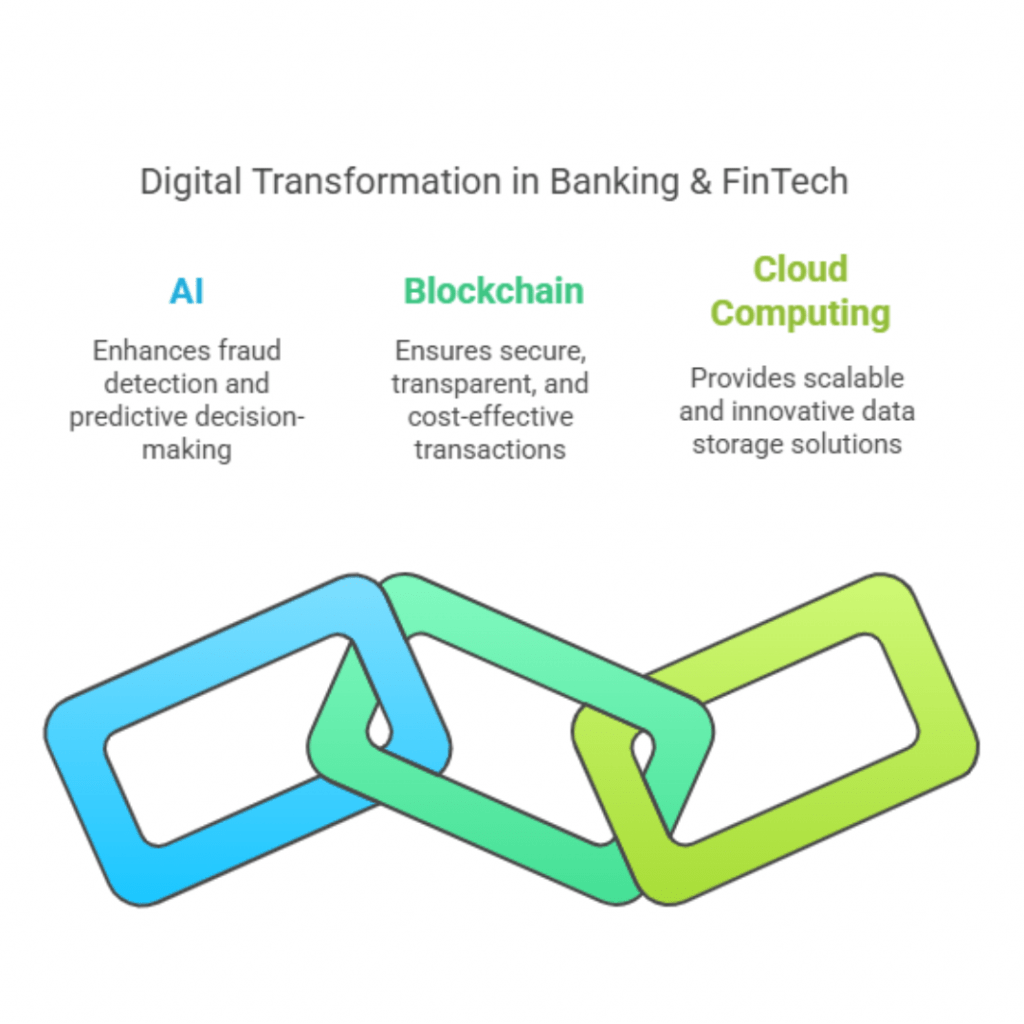Almost everything we do in our daily lives is changing because of digital technology. It shouldn’t be a surprise that banks and FinTech are also changing quickly. New tech-based banking methods are taking the place of old ones. These are faster, better, and easier for people to use. People are better able to handle their money now that things are more digital. As more people learn about the perks of digital banking, it’s important to know how the shift to digital is changing the future of FinTech. Businesses can better meet customer wants and stay competitive in a world that is changing quickly thanks to this change.
The Growth of Digital Transformation
We know that the financial services business is quite traditional and takes a while to adapt to new ideas, but the pandemic has changed everything. It has sped up real change by adopting fast digital and physical transformation. This means that the fintech industry has to meet the challenge of giving companies powerful computers.
The main reason for changes is that people’s habits are changing quickly, and new patterns are forming because people want to do things without cash or touching.
The short list of numbers below shows how quickly digital transformation is being used in banking.
-
- Forbes says that so far, only 14% of banks that are moving forward with their digital change in FinTech have used machine learning tools.
-
- The market for digital transformation is projected to grow at a rate of 23% per year and reach $3.3 trillion by 2025.
What is Digital Transformation in FinTech?
Digital technology is part of almost everything we do today. No wonder the industry in banking and fintech is changing so quickly. Traditional banking methods are replaced by new technological solutions. These solutions allow banking faster, safer and better for customers. People see how useful digital platforms can be. Understanding how digital transformations work in Fintech is the key to staying ahead in this rapidly changing world. The use of this technological solution will help businesses remain competitive and provide better services to their customers.
For example, mobile payments solutions have gained a huge traction because they offer comfort, reduced fees, and increased availability. Fintech is not just about replacing old methods. It is about creating new opportunities.
Also Read: Role of Technology in Digital Transformation
Key Technologies Driving Digital Transformation in Banking & FinTech
There are several technologies to control this digital transformation. Among them, AI stands out as one of the most powerful tools in customer service automation, fraud detection and personalized financial recommendations. Blockchain brings a level of transparency and security that traditional financial systems cannot match. And Cloud Computing allows you to make your services effectively scale and ensure data security.
All of these technologies together create a financial ecosystem that is not only effective but also more transparent and more focused on users.
Also Read: The Importance of Digital Transformation for the Industry
The Role of AI, Blockchain, and Cloud Computing in Digital Transformation

AI
The ability to process a huge amount of data and to make predictive decisions is one of the primary drive forces of the digital transformation in Fintech. AI helps financial institutions spot fraud right away. This reduces the risk of financial fraud.
Blockchain
Blockchain makes transactions safer, clear, and easy to track. It removes the need for middlemen in financial deals, which lowers costs and speeds up processes. Blockchain is especially changing the way money is sent between countries, making it cheaper and faster. This technology helps ensure that every transaction is transparent and secure, reducing the chance of errors or fraud.
Cloud Computing
With the advent of cloud computing, financial institutions are able to store a huge amount of data safely and at lower costs, allowing them a faster scale services and innovate faster. Cloud flexibility also makes it easier to develop products and provides the ability to provide services around the world.
Also Read: Digital Transformation Examples for Business Success
Role of Digital Transformation in Security and Compliance
Security is paramount when it comes to digital transformation in FinTech. With more data being exchanged online, financial institutions must invest in robust cybersecurity measures to protect sensitive customer information. Blockchain, with its decentralized nature, is one such technology that enhances data security.
Additionally, digital transformation helps financial services meet the ever-growing regulatory compliance standards. With technologies, institutions can automate compliance checks, reducing the risk of human error and improving adherence to regulations.
Also Read: The Top Benefits of Digital Transformation in Paymen Landscape
Impact on Operational Efficiency and Cost Reduction
Another significant benefit of Digital Transformation in FinTech is the drastic improvement in operational efficiency. Processes that used to take days are now being completed in real-time. Automation tools and AI have replaced manual tasks, allowing financial institutions to focus on more strategic activities.
It’s estimated that over 60% of financial institutions that embraced digital transformation saw a reduction in operational costs within the first year.
This reduction in operational costs, coupled with the ability to provide services faster, means companies can redirect resources towards innovation and improving customer offerings. 
Challenges of Implementing Digital Transformation in FinTech
The benefits of digital transformation in FinTech are clear. However the journey has challenges. Financial institutions face issues like old systems and data privacy concerns. There is also resistance to change. Adopting new technologies needs a big investment in infrastructure and training. This can be a big hurdle for smaller firms.
However, these challenges can be overcome with the right strategy and the use of proven solutions. At Aeologic Technologies, we help businesses implement seamless digital transformations, ensuring that they stay ahead in this ever-evolving space.
Also Read: How Digital Transformation Can Reduce Business Costs
The Future of Digital Transformation in Banking & FinTech
The future of banking and FinTech lies in continued innovation. As technology continues to evolve, we can expect even more personalized, secure, and efficient solutions. The next wave of transformation will likely include the rise of open banking, where third-party developers can create financial services apps that integrate with traditional financial institutions.
Moreover, technologies like quantum computing could revolutionize financial services by providing faster data processing capabilities, further pushing the boundaries of what’s possible.
Also Read: Digital Transformation Examples in Banking
Final Words
Digital transformation in Fintech and banking is not just about adapting to new technologies. It is about redefining the way of providing financial services. As the industry evolves, those who accept and innovate these changes will remain in the foreground. The future of banking is digital and moves faster than ever before.
Don’t forget to share this with your network and keep pushing the boundaries of innovation in your organization.






